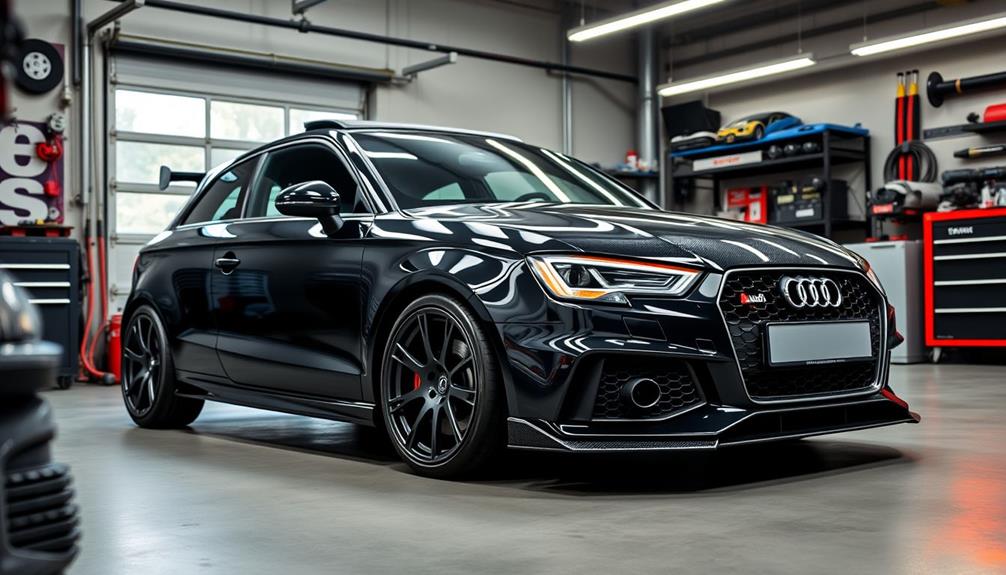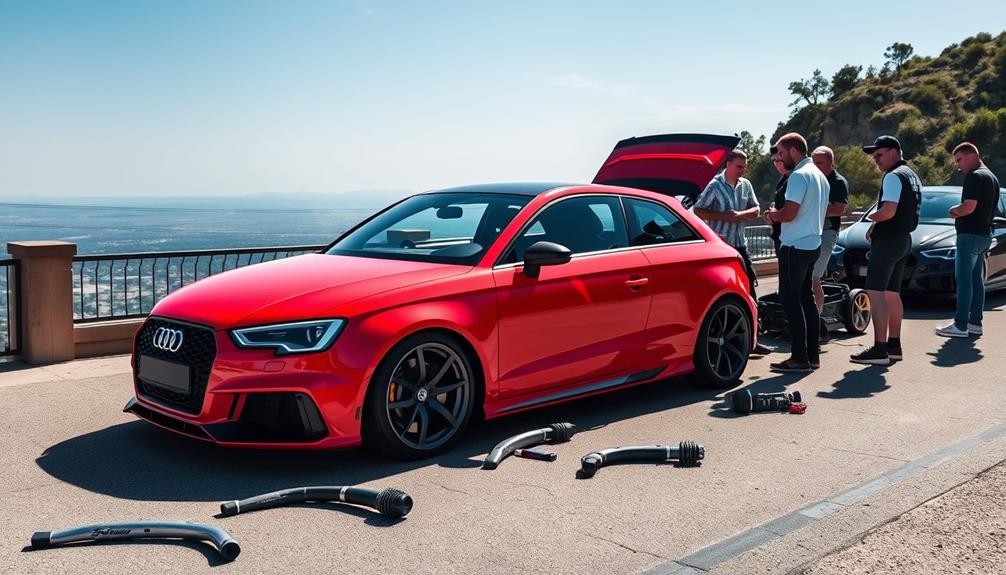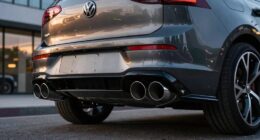To make the most of your Audi S1, start with essential tuning upgrades like an ITG Air Filter for better airflow and a Tarox Sport Compact Big Brake Kit for improved stopping power. Consider Stage 1 tuning to boost horsepower from 231 to 302 and reduce the 0-62 mph time to around 3.9 seconds. If you want even more power, Stage 2 modifications, including a new exhaust and larger intercooler, can push output to about 322 hp. Engaging with the tuning community can also provide tips on optimizing performance and reliability as you enhance your driving experience.
Key Takeaways
- Start with Stage 1 tuning to boost the Audi S1's power from 231 hp to approximately 302 hp for a thrilling driving experience.
- Upgrade to an ITG Air Filter to improve airflow and enhance engine sound, maximizing performance efficiency.
- Invest in the Tarox Sport Compact Big Brake Kit for significantly improved braking performance and safety during spirited driving.
- Consider the Air Lift Air Ride System for adjustable ride height, enhancing handling dynamics and overall driving comfort.
- Engage with the tuning community for valuable insights and experiences to optimize your modifications and ensure vehicle integrity.
Audi S1 Overview
The Audi S1 stands out as a compact hot hatch, boasting a powerful 2.0-liter turbocharged TFSI engine that delivers 231 PS and 370 Nm of torque. This impressive powertrain gives you a thrilling driving experience, allowing you to accelerate from 0-62 mph in just about 5.8 seconds. With a top speed electronically limited to 155 mph, you won't be short on excitement.
Equipped with Audi's renowned Quattro all-wheel drive system, the S1 provides enhanced traction and stability. Whether you're maneuvering tight corners or tackling various weather conditions, you can trust the S1 to keep you grounded.
Its lightweight chassis and sport-tuned suspension further contribute to its agile handling and responsive steering, making it a formidable competitor among hot hatch rivals.
The S1's compact design and sporty aesthetics, featuring an aggressive front grille and distinctive badging, make it visually appealing. You'll appreciate how it not only looks the part but also delivers on performance, combining practicality with excitement.
Essential Tuning Upgrades

When tuning your Audi S1, focusing on essential upgrades can transform your driving experience.
From performance enhancements like an ITG air filter to hardware upgrades such as a Tarox Big Brake Kit, each modification plays a crucial role in boosting both power and safety.
Let's explore the key steps in the tuning process to maximize your S1's potential.
Performance Enhancements Overview
Enhancing your Audi S1's performance requires a strategic approach to tuning upgrades that maximize both power and handling.
Start by upgrading to an ITG Air Filter, which enhances airflow and engine sound, optimizing air intake efficiency for your turbocharged engine. This improvement not only boosts performance but also adds a thrilling auditory experience.
Next, consider the Tarox Sport Compact Big Brake Kit. With six-piston calipers and 325mm drilled discs, this kit considerably increases your stopping power, ensuring safety during high-speed maneuvers.
Pair this with Goodridge Braided Hoses for a firmer brake feel and enhanced corrosion resistance, further elevating your braking performance.
For handling upgrades, the Air Lift Air Ride system allows you to adjust ride height, providing both comfort and improved handling dynamics during spirited driving.
Essential Hardware Upgrades
Upgrading your Audi S1 with essential hardware modifications can considerably elevate its performance and driving experience. Here are some vital upgrades you should consider:
| Upgrade | Benefits |
|---|---|
| ITG Air Filter | Enhances airflow and engine sound, improving engine efficiency and responsiveness. |
| Tarox Sport Compact Big Brake Kit | Boosts braking performance with six-piston calipers and 325mm drilled discs for safety. |
| Race Cat Downpipe | Improves exhaust flow and sound, potentially increasing horsepower (lambda sensor extension may be needed). |
| Lightweight Rotiform DTM Wheels | Enhances aesthetic appeal, improves handling and grip due to lightweight construction. |
Additionally, utilizing the Air Lift Air Ride system allows for adjustable ride height. This upgrade gives you practicality for daily driving while offering an aggressive lowered stance for spirited performance. With these essential hardware upgrades, you'll not only enhance your Audi S1's engine performance but also its braking performance, ensuring a thrilling and safe driving experience. Invest in these modifications, and you'll see a significant transformation in both handling and overall enjoyment behind the wheel.
Tuning Process Steps
The tuning process for your Audi S1 can be an exciting journey toward revealing its full potential.
Start by creating a ZIPtuning account, which opens the door to various tuning services and customization options tailored for your ride. After that, purchase tuning credits using secure payment methods, allowing you to manage your budget effectively throughout the tuning process.
Next, upload your original vehicle files. These files are vital for making tailored adjustments to your engine's performance.
Once you've uploaded the files, the real magic begins. Your custom tuning file, featuring essential ECU remapping, will be ready for download within 60 minutes. This quick turnaround helps minimize downtime so you can get back on the road faster.
To achieve the best results with your tuned Audi, consider additional hardware upgrades like a larger turbo or enhanced exhaust systems.
These modifications work in tandem with your ECU remapping to provide significant power increases, ensuring your Audi S1 reaches its ultimate potential.
Embrace the journey and enjoy the thrill of transforming your hot hatch into a performance powerhouse.
Stage 1 Tuning Benefits

When you opt for Stage 1 tuning on your Audi S1, you're looking at a remarkable power boost, skyrocketing from 231 hp to around 302 hp.
You'll also notice a significant torque increase, enhancing both acceleration and overall drivability.
Plus, improved throttle response means your car will react faster to your commands, giving you a more thrilling driving experience.
Power Increase Overview
Releasing the full potential of your Audi S1 through Stage 1 tuning offers an impressive boost in power and performance. You can expect an increase in horsepower from 231 hp to around 302 hp, greatly enhancing your driving experience. This power increase not only amplifies your engine's output but also transforms how your S1 handles the road.
The modifications involved in Stage 1 tuning include raising turbo pressure and fine-tuning the air-fuel mixture, resulting in improved throttle response. Furthermore, the ECU software adjustments often eliminate the speed limiter, allowing you to reach higher top speeds.
With this tuning, you'll notice a remarkable reduction in your 0-62 mph time, dropping from 5.8 seconds to an exhilarating 3.9 seconds.
This substantial performance upgrade leads to a more engaging and dynamic driving experience, making every drive feel like an adventure.
With the power increase from Stage 1 tuning, your Audi S1 won't only be faster but also more responsive, giving you the confidence to tackle any road with excitement. Embrace the thrill of enhanced power and performance!
Torque Enhancement Details
Boosting torque in your Audi S1 during Stage 1 tuning greatly enhances your driving experience.
With torque increases from 273 lb-ft to around 327 lb-ft, you'll feel the difference immediately. This tuning stage not only amps up your S1 Sportback's responsiveness but also improves acceleration, making every drive more exhilarating.
Here are some key benefits of Stage 1 torque enhancement:
- Improved Acceleration: The extra torque translates to quicker starts and better overtaking capabilities.
- Enhanced Performance: Power rises from 231 hp to approximately 302 hp, providing a thrilling driving experience.
- Optimized Combustion: Increased turbo pressure and better air-fuel ratios lead to more efficient engine performance.
- Faster 0-62 mph Time: Experience a dramatic reduction in time from 5.8 seconds to about 3.9 seconds, showcasing the substantial gains from this tuning.
Throttle Response Improvement
Alongside the impressive torque enhancements achieved through Stage 1 tuning, you'll notice a remarkable improvement in throttle response. This tuning stage considerably increases turbo pressure and optimizes the air-fuel ratio, boosting your Audi S1's power output from 231 hp to approximately 302 hp.
You'll feel the difference as the ECU adjustments enhance throttle sensitivity, allowing for quicker acceleration and a more engaging driving experience.
With Stage 1 modifications, torque output rises from 273 lb-ft to around 327 lb-ft, translating to improved low-end performance and responsiveness. This means that when you press the accelerator, your car reacts almost instantly, making it feel more alive on the road.
You'll also be impressed by the reduction in 0-62 mph time, dropping from 5.8 seconds to as low as 3.9 seconds. This dramatic impact on acceleration not only elevates your driving experience but also enhances the overall performance metrics of the S1.
In short, Stage 1 tuning makes your Audi S1 feel more dynamic, allowing you to enjoy every twist and turn with enhanced throttle response.
Stage 2 Modifications

Building on the enhancements from Stage 1, Stage 2 modifications for the Audi S1 take performance to the next level by incorporating essential hardware upgrades.
You can expect impressive gains in power output, pushing to around 322 horsepower and 356 lb-ft of torque. These upgrades greatly enhance your driving experience, reducing the 0-62 mph time to approximately 5.5 seconds.
To maximize these benefits, consider the following key upgrades:
- New Exhaust System: Improves exhaust flow, enhancing overall power.
- Larger Intercooler: Increases cooling efficiency, protecting your engine under load.
- Cold Air Intake: Boosts airflow, essential for peak performance.
- ECU Remapping: Guarantees compatibility with upgraded components for reliability.
Additionally, it's wise to reinforce your clutch system to handle the increased torque and prevent slippage during heavy acceleration.
Stage 3 Enhancements

Stage 3 enhancements catapult your Audi S1 into the domain of high-performance vehicles, pushing the limits of power and efficiency. By upgrading to a larger turbocharger and adding a blow-off valve, you greatly increase air intake and pressure, resulting in a final power output of up to 283 kW (385 hp) and 506 Nm (373 lb-ft) of torque.
That's a remarkable 66% increase from the stock configuration!
To guarantee peak performance with your new hardware, you'll need to make additional software adjustments. This level of tuning transforms your Audi S1 into a street-legal racecar, delivering exhilarating acceleration and dynamic driving experiences.
However, with great power comes great responsibility. You must carefully consider your drivetrain components to handle the increased power and torque effectively. Focus on clutch upgrades to prevent slippage, assuring that your enhanced performance translates into a thrilling driving experience without compromising reliability.
Stage 3 enhancements not only elevate your vehicle's capabilities but also bring a new level of excitement to your daily drives. Get ready to experience the true potential of your Audi S1!
Community Insights and Experiences

After exploring the impressive potential of Stage 3 enhancements, it's clear that the Audi S1 tuning community plays a vital role in shaping your tuning journey.
Engaging with fellow enthusiasts can provide valuable insights and experiences that help you make informed decisions. Many Audi S1 owners stress the importance of clutch upgrades to handle the increased torque effectively, as seen in discussions on Audi-Sport.net.
Here are some key takeaways from the community:
- Consult experienced tuners: Custom mapping from experts like MRC in Milton Keynes can optimize performance while ensuring reliability.
- Share successful experiences: Many users report significant power gains and improved throttle response from their Stage 1 and Stage 2 tuning.
- Explore performance modifications: Upgrades like the ITG Air Filter and Tarox Sport Compact Big Brake Kit enhance overall driving dynamics.
- Balance performance and integrity: There's a strong consensus on maintaining vehicle integrity while pursuing enhancements, encouraging new members to seek advice before diving in.
Performance Comparisons and Rivalry

While exploring the compact hot hatch segment, you'll quickly find the Audi S1 stands out for its impressive performance metrics, rivaling well-known competitors like the VW Golf GTI and Mini Cooper S.
With a power output of 231 PS (170 kW), the S1 competes fiercely, but when you tune it to Stage 1, you can release an exhilarating 302 hp, outpacing rivals like the Ford Fiesta ST and Opel Corsa OPC.
In head-to-head acceleration tests, the S1 sprints from 0-62 mph in around 5.9 seconds, positioning it alongside other high-performance hot hatches, including the formidable Mercedes A45 AMG.
The Audi S1's Quattro all-wheel-drive system enhances grip and traction, giving you an edge against competitors in various weather conditions and on challenging roads.
With top-tier tuning options available, such as upgrades from ABT, you can push the S1's output to an impressive 310 PS (228 kW).
This solidifies its competitive edge against models like the Toyota GR Yaris, making the S1 a standout choice in the hot hatch rivalry.
You won't be disappointed by its performance.
Frequently Asked Questions
What Do You Need for Stage 2 Audi S1?
For Stage 2 on your Audi S1, you'll need an upgraded exhaust system, larger intercooler, cold air intake, and a thorough ECU remap. Don't forget high-quality fuel and consider supporting mods for better performance.
What Do You Need for Stage 2 Audi S1?
To access Stage 2 power, you can't just upgrade; you must enhance. Install a new exhaust system, larger intercooler, cold air intake, and remap the ECU. You'll feel the thrilling performance boost!
Is the Audi S1 Fast?
Yes, the Audi S1 is fast. Its 2.0-liter turbocharged engine delivers impressive acceleration, reaching 0 to 60 mph in about 5.7 seconds. You'll enjoy its responsive throttle and agile handling on any road.
Is the Audi S1 Fast?
Picture yourself behind the wheel, feeling the rush as the Audi S1 sprints to 60 mph in just 5.7 seconds. Yes, it's fast, with its agile handling and Quattro grip making every drive exhilarating.
Conclusion
As you immerse yourself in the world of Audi S1 tuning, you're only scratching the surface of what this hot hatch can truly become. Each upgrade, from Stage 1 to Stage 3, reveals hidden potential and transforms your driving experience. Just imagine the roar of your engine as you hit the road, leaving rivals in the dust. Are you ready to release the beast within? The journey of performance and power awaits—don't hold back.









